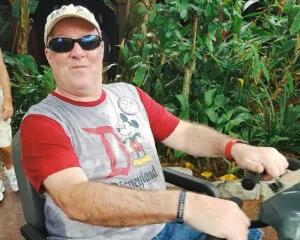July is Disability Pride Month
During Disability Pride Month VeDA would like to shine a light on the accomplishments, contributions, and experiences of people who are disabled by their vestibular condition.
Many people who suffer from chronic vestibular disorders find it difficult to continue working due to the physical and cognitive impacts of their illness. We know that vestibular problems are very real and disabling, affecting not only people’s ability to work but to perform common, everyday tasks such as shopping, cooking, cleaning, bathing, and more. Although vestibular disorders are invisible, they are no less disabling than more obvious injuries and illnesses.
In addition to overcoming the obstacles imposed by a vestibular condition, we recognize the courage it takes for vestibular warriors to stand up for themselves and request the accommodations they need (and deserve) to function in our society and lead a fulfilling life.
Disabled does not mean broken; it is a badge of honor for those who have endured.
Disability Resources
Given the disabling nature of vestibular disorders, it is crucial to recognize their impact and consider them as valid reasons for individuals to be eligible for disability insurance. Access to such insurance can provide vital financial support and resources to help individuals navigate the challenges posed by these disorders and maintain a reasonable quality of life.
Applying for disability can be a complicated and intimidating process, compounded by the insurance industry’s lack of understanding about vestibular disorders. In addition to typical bureaucratic hurdles, vestibular patients often face resistance when applying for disability because they "look fine." If you are experiencing problems functioning in your job at your former level of competence, VeDA has a guide to help you navigate the disability application process. Click below to learn more.
Stories From the Vestibular Community
Darcy Bonjour

When meeting new people, one of the first things they often ask is, "Where do you work?" This is a question that didn't used to bother me. I would answer that I worked at the Social Security Office. I loved my job, so I was happy to share where I worked. Then, 15 years ago, I became very ill with vestibular disorders that caused severe, non-stop vertigo and I became deaf. My life suddenly changed, and not only could I not work but I had to file for and receive disability benefits.
When I worked, I had spent years telling people it was okay to receive disability benefits. I told them they had paid into the system so they deserved to receive them. Now I was on the other side, receiving the benefits. I was too embarrassed to tell people I was on disability. Instead, I would say I took an early retirement. I heard many people make disparaging comments about people receiving disability, especially when it was an invisible illness. They felt everyone should work. There is such a stigma attached to it and I did not want to be known as a disabled person.
In time, I realized that was not fair to myself or anyone else who was disabled. I needed to take care of myself and not worry about what others thought of me. I began to become involved in patient advocacy to help educate and encourage others who are sick, to let them know they are not alone and that it is okay to be ill and even be on disability.
If you have a disability, you need to take care of yourself. What others think of you is not something you need to worry about. You are important. It is okay if someone asks, "Where do you work?" to simply reply, "I am unable to work because I am disabled."
David Morrill
Being disabled never defines who you are, but it can sometimes make you a stronger person overall.
People frequently assume that a person with a disability can’t function in society. However, that is far from the truth. Thanks to laws in the US and changing perceptions of disabled individuals, we have made significant progress in understanding and showing empathy towards our disabled population.
My disability is invisible, causing issues with balance and constant dizziness. Most people can't see the struggles I face every day. Personally, I can't do the simple things I used to take for granted. For example, climbing a ladder and doing basic chores around my house has become challenging. In the past, I didn't have to think about each step for my own safety, but now I do. Even going out for a night of entertainment can be tiring, and I may have to shorten or cancel the event sometimes.
To help me navigate my daily activities, I use poles or canes, especially when walking on rough terrain. When my disability first started, I relied on a walker because I was too unsteady to walk on my own. I always recommend using these devices to prevent making your situation worse by falling.
In the US, there's a social security disability program. Although these programs and the qualifications might seem daunting, I encourage everyone to visit their local office and speak with an agent to learn how to start the disability application process. It's always helpful to bring an advocate, like a family member or a friend, who can assist you with questions and provide encouragement. Sometimes, you may need to seek help from professionals such as a social security lawyer or others who are qualified in this field.

